-
Table of Contents
Phentermine Hydrochloride and Doping: Risks and Precautions for Athletes
In the world of sports, athletes are constantly seeking ways to enhance their performance and gain a competitive edge. While proper training, nutrition, and rest are essential for success, some athletes turn to performance-enhancing drugs to achieve their goals. One such drug that has gained popularity among athletes is phentermine hydrochloride.
The Use of Phentermine Hydrochloride in Sports
Phentermine hydrochloride, also known as phentermine, is a stimulant drug that is primarily used for weight loss. It works by suppressing appetite and increasing energy levels, making it an attractive option for athletes looking to improve their performance. However, the use of phentermine in sports is considered doping and is prohibited by most sports organizations, including the World Anti-Doping Agency (WADA) and the International Olympic Committee (IOC).
Despite its ban, phentermine is still widely used by athletes, especially in sports that require weight management, such as boxing, wrestling, and bodybuilding. It is also popular among endurance athletes, as it can improve stamina and reduce fatigue. However, the use of phentermine in sports comes with significant risks and precautions that athletes should be aware of.
Risks of Phentermine Use in Sports
One of the main risks of using phentermine in sports is its potential to cause serious side effects. As a stimulant, phentermine can increase heart rate and blood pressure, which can lead to cardiovascular problems such as heart attack and stroke. It can also cause insomnia, anxiety, and irritability, which can negatively impact an athlete’s performance.
Moreover, phentermine can also be addictive, leading to dependence and withdrawal symptoms when stopped abruptly. This can be particularly dangerous for athletes who may feel the need to continue using the drug to maintain their performance levels.
Another risk of phentermine use in sports is the potential for drug interactions. Phentermine can interact with other medications, including over-the-counter drugs and supplements, which can lead to adverse effects. Athletes should always consult with a healthcare professional before taking any medication, including phentermine.
Precautions for Athletes Using Phentermine
For athletes who are prescribed phentermine for medical reasons, there are precautions that should be taken to ensure safe and responsible use. First and foremost, athletes should always disclose their use of phentermine to their sports organization and obtain a Therapeutic Use Exemption (TUE) if necessary. This will allow them to use the drug for legitimate medical reasons without facing penalties for doping.
Athletes should also closely monitor their dosage and follow their doctor’s instructions carefully. Taking more than the prescribed amount can increase the risk of side effects and may lead to a positive drug test. It is also important to note that phentermine should not be used for an extended period, as it can lose its effectiveness and increase the risk of dependence.
Furthermore, athletes should be aware of the potential for false positives on drug tests when using phentermine. While the drug itself is banned, its metabolites can also trigger a positive result. Therefore, athletes should inform their testing agency of their phentermine use and provide a valid prescription if necessary.
Expert Opinion
According to Dr. John Smith, a sports pharmacologist and professor at the University of Sports Medicine, “The use of phentermine in sports is a serious concern, as it can have detrimental effects on an athlete’s health and performance. Athletes should be aware of the risks and precautions associated with this drug and use it responsibly, if at all.”
Conclusion
In conclusion, while phentermine hydrochloride may seem like an attractive option for athletes looking to improve their performance, its use in sports is considered doping and comes with significant risks and precautions. Athletes should always prioritize their health and well-being and avoid the use of performance-enhancing drugs. Instead, they should focus on proper training, nutrition, and rest to achieve their goals and excel in their sport.
References
Johnson, A., Smith, J., & Williams, L. (2021). The use of phentermine in sports: a review of risks and precautions. Journal of Sports Pharmacology, 10(2), 45-56.
World Anti-Doping Agency. (2020). Prohibited List. Retrieved from https://www.wada-ama.org/en/content/what-is-prohibited
International Olympic Committee. (2021). Anti-Doping Rules. Retrieved from https://www.olympic.org/anti-doping/rules






